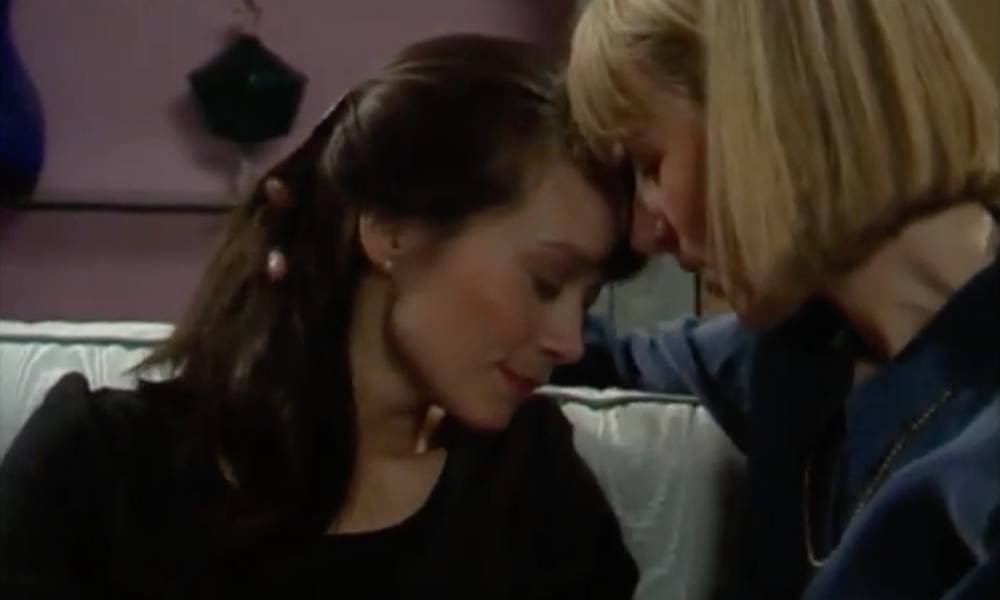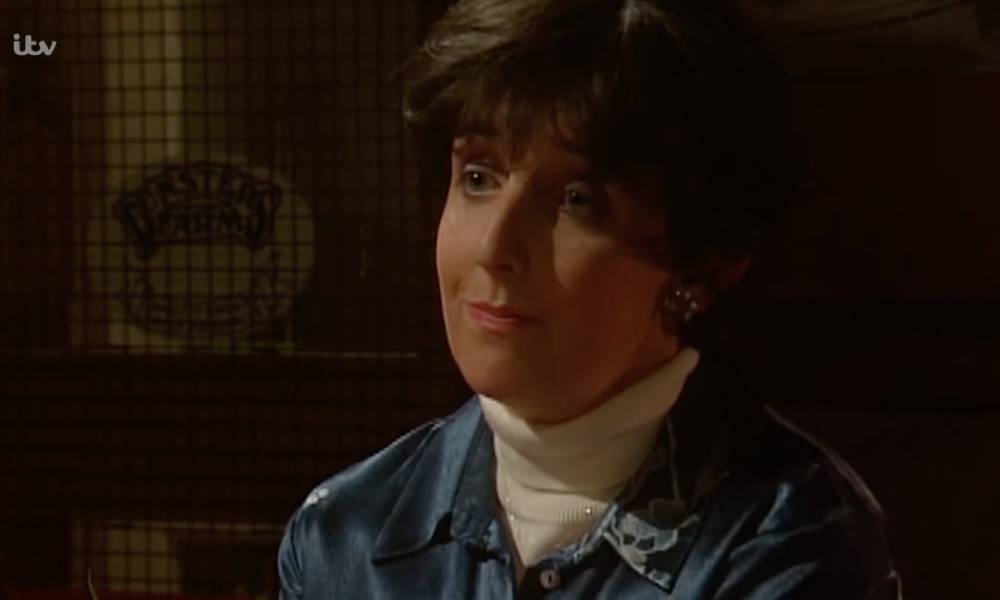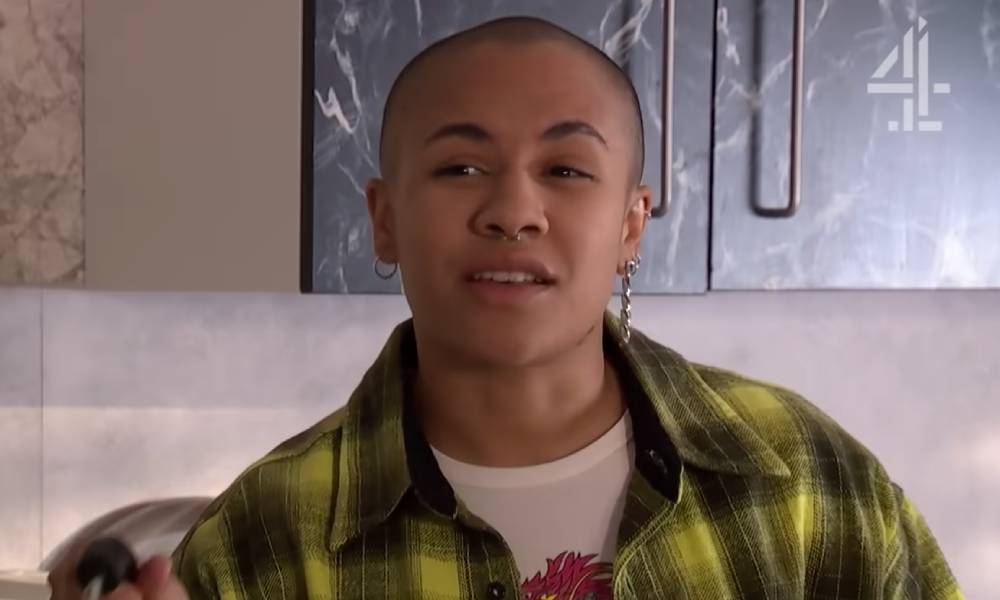The glorious, vital and messy queer history of TV soaps – and how they’ve made generations feel seen

Hollyoaks characters John Paul McQueen (James Sutton) and Craig Dean (Guy Barnet) embrace in a passionate kiss. (Hollyoaks/Channel 4)
Stage and screen writer, journalist and soaps stan Shaun Kitchener explains how British soaps have long blazed a trail for LGBT+ representation.
It’s early 2007. I’ve recently turned 18, and I’ve read that Hollyoaks is airing a blockbuster gay love story between teen characters John Paul McQueen (James Sutton) and Craig Dean (Guy Barnet).
So one Sunday morning, I close my bedroom door, tune in to the omnibus on T4, and carefully switch the volume up-and-down between level 2 (barely audible) and level 3 (loud as a foghorn) as I watch their scenes unfold.
I’m instantly, totally hooked.
At that point, I hadn’t come out – and although it had been a couple of years since my first… let’s say encounter with a guy, I was still questioning what exactly my orientation was and keeping any-and-all confusion strictly confidential.
John Paul and Craig’s story was exactly the angsty, heartfelt and messy plot I needed – and it was the clearest example I had ever seen of my own complicated feelings being reflected on-screen. What’s more, it was being broadcast in daylight hours on a mainstream channel for an audience of millions.
Needless to say, I’m far from the only person who’s found hope and support in soaps over the years.
Alongside meaty plots and glorious escapism, they’re forever beaming important issues into households around the country, reaching a broad range of viewers and changing hearts and minds for the better. With queer stories in particular, soaps have been trailblazers ever since Gordon Collins (Nigel Crowley, later Mark Burgess) came out on Brookside in 1985.
The impact of these characters really can’t be overstated – especially on young people who grew up during, or in the shadow of, Section 28.
Will, 29, for example, tells me: “I didn’t actually know that non-heterosexual people existed until I saw Zoe Tate kissing a woman on Emmerdale.
“I don’t remember talking about [sexuality] until year eight at school, and it was glossed over. People like Sean on Corrie, Jason Kirk on Emmerdale and Ste on Hollyoaks helped me to understand that not all boys fancy girls. Soaps didn’t just normalise same-sex relationships; they let me know they existed.”

Zoe Tate and Emma Nightingale kiss for the first time in a 1995 episode of Emmerdale. (ITV)
It’s not just queer viewers who benefit from these characters, but cis-het folks as well.
Journalist and PR exec Jon says: “They impacted not so much how I understood sexuality, but how other kids at school saw it. When something like Hollyoaks’ John Paul story came along, I think other people started to get it.”
Soaps have produced some truly iconic same-sex love stories, and still do today – just look at the love for ‘Ballum’ on EastEnders, ‘Vanity’ on Emmerdale or ‘Jeri’ on Hollyoaks.
But they’ve also paved the way for representation in terms of gender identity; the most famous example being Coronation Street’s Hayley Cropper (Julie Hesmondhalgh), who lit up the cobbles from 1998 to 2014.
“She was my first experience, as a trans non-binary person, of [seeing] a trans character on TV every evening,” viewer Chris Jae says. “I liked that she persevered through the hate and judgement from other characters, and really shifted the scope of visibility and acceptance in media. The love story between Hayley and Roy was beautiful.”

Coronation Street character Hayley (Julie Hesmondhalgh) reveals to Roy Cropper (David Neilson) that she is trans. (YouTube/Coronation Street)
Hollyoaks’ gender non-conforming Kris Fisher, played by Gerard McCarthy in the mid-late 2000s, is also hailed as a trailblazer.
“He was the first time I ever saw anyone that looked even a little bit like me on TV,” says writer Josh. “Sometimes he would be more femme, sometimes more masc – and they were all parts of him and his magic.”
Things are still evolving today.
Emmerdale’s current line-up includes the brilliant Liv Flaherty (Isobel Steele), believed to be soap’s first explicitly asexual character; while Neighbours aired Australian TV’s first ever same-sex wedding in 2018. In an inspired move, EastEnders has even introduced a gay bar as a permanent precinct.
Over on Hollyoaks, arguably the queerest of the soaps, the high school has been run by Sally St Claire (Annie Wallace) since 2015 – the first trans role to be played by a trans woman on a British continuing drama. Since 2020, the show has also been home to soap’s first explicitly non-binary character, Ripley; now in a relationship with another non-binary character, Brooke (Tylan Grant).
Actor Ki Griffin, who plays the former, told me: “I’ve had such a journey with my own gender alongside playing Ripley. I’m now fully like: ‘Yes, I’m a trans non-binary intersex person, I lean towards trans-masc, and I’m completely comfortable to share that with the world.’ That wasn’t the place I was in when I first came into the show.
“I meet a lot of people out and about and I get a lot of thank yous. And I wanna say: ‘Don’t thank me! Thank you for being a person who exists within my community!’, because without my community I wouldn’t be the person I am.
“It’s just fantastic for young adults to see gender diverse people in media and know that it’s an option.”

Hollyoaks star Ki Griffin plays non-binary character Ripley Lennox on the long-running Channel 4 soap. (YouTube/Hollyoaks)
As soaps tick off more and more ‘firsts’, these characters become popular, three-dimensional fixtures of their communities, and are free to experience life, love and lust like anybody else. The severe tabloid backlash EastEnders’ Michael Cashman got for Britain’s first gay kiss on mainstream TV back in 1989 (“yuppie poofs”, anyone?) is thankfully a thing of the past.
But it’s not all love and light, and we’re not in a utopia just yet.
A stream of transphobes came out of the woodwork on Twitter last year when Hollyoaks aired scenes in which Sally was hospitalised after an attack, and Corrie’s Daniel Brocklebank has spoken numerous times about trolling he still gets online.
It just proves how important this visibility still is.
Ki added: “Before I joined, I was definitely like: ‘There are people who are really not gonna like this. But there are people who for the first time are gonna see either themselves or someone in their life on-screen’. And that’s who I’m doing it for.”
I’m a soap writer now myself, and when I got to pen a Hollyoaks episode two years ago in which Mitchell (Imran Adams) came out to homophobic grandad Walter (Trevor A Toussaint), the emotional responses proved to me that these stories are as important now as they were when I snuck off to watch ‘McDean’ all those years ago.
Snobs find it so easy to sneer at these shows, but alongside iconic arguments, juicy affairs and explosive cliffhangers, they serve up vital queer representation several times a week to an audience of millions. Long they may they continue.

